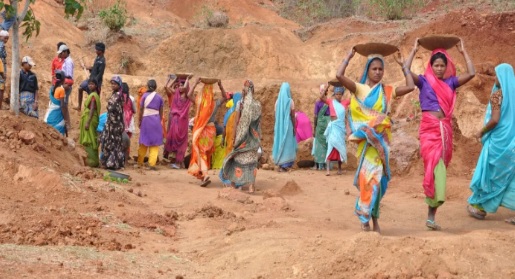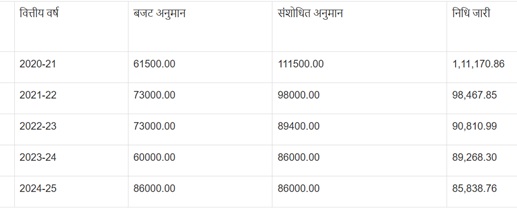| (Mains Exam, General Studies Paper- 2: Welfare schemes for vulnerable sections of the population by the Centre and the States and the performance of these schemes; Mechanisms, Laws, Institutions and Bodies constituted for the protection and betterment of these vulnerable sections) |
Context
Civil society activists have expressed concern that the continuous reduction in funds released for the Mahatma Gandhi National Rural Employment Guarantee Scheme (MGNREGA) is adversely affecting the income and financial security of rural women.

Importance of MNREGA for Women
- Provides a minimum of 100 days of guaranteed wage employment in rural areas.
- Women constitute about 55-60% of the workforce in this scheme, making it an important source of livelihood and empowerment.
Status of Budgetary Support
- In recent years, the budget allocation for MNREGA has generally increased but the actual funds released have decreased. This has resulted in payment delays, rationing of work and reduced availability of employment days.
- This disproportionately affects women who are more dependent on local wage work due to limited mobility.
- The details of the Budget Estimates stage, Revised Estimates stage and funds released (in Rs crore) under the Mahatma Gandhi National Rural Employment Guarantee Scheme (Mahatma Gandhi NREGA) in the last five years are given below-

- Since Mahatma Gandhi NREGA is a demand-based wage employment scheme, the budgetary outlay is determined based on the anticipated demand for employment in a particular financial year.
- The Ministry regularly assesses fund requirements based on demand and seeks additional funds under Mahatma Gandhi NREGA from the Ministry of Finance as required.
- The budget allocation of ₹86,000 crore for the financial year 2024-25 was the highest ever allocation for the scheme at the Budget Estimates (BE) stage since its inception. In the financial year 2025-26, the government has retained this allocation at ₹86,000 crore.
Impact on women
- Declining incomes of rural households, especially for single women and widows
- Possibility of reduced financial independence and bargaining power of women within households
- Greater vulnerability to poverty, migration and informal exploitative labour markets
- Possibility of weakening the role of this scheme in poverty alleviation, gender empowerment and social protection
- Fund contraction contrary to the mandate of rural employment guarantee
Way forward
- Ensure adequate and timely release of funds for MNREGA
- Prioritise women-centric employment opportunities
- Emphasis on strengthening social audit and transparency mechanisms
- Link MNREGA with climate adaptation and care work to expand opportunities




